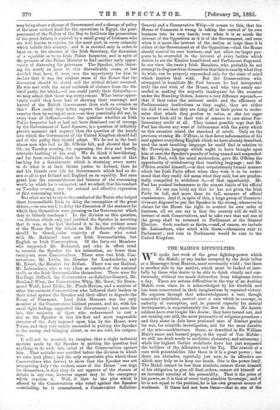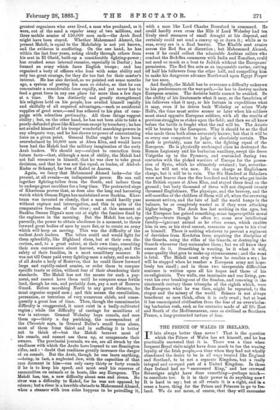THE MARDI'S DIFFICULTIES. Av -E spoke last week of the great
fighting-power which the Mahdi, or any leader accepted by the Arab tribes as a Messenger from Heaven, must necessarily wield • but there is another side to the matter, which must be looked at carefully by those who desire to be able to think clearly and continuously, without too much distraction from telegrams twice a day. There are serious difficulties in the way of an Arabian Mahdi, even when he is acknowledged by his kinsfolk and has been consecrated in their imaginations by repeated victory. He acquires through that acknowledgment a vast, though somewhat indefinite, control over a race which in courage, in audacity of conception, and in general capacity for mental development, is unquestionably the first in Asia. No Asiatic soldiers have ever fought like Arabs ; they have turned out, ind are turning-out still, the most persuasive of religious preachers ; and they alone in Asia have produced men of distinct genius for war, for scientific investigation, and for the most durable of the arts—architecture. Omar, as described in Sir William Muir's exact and learned pages, is the equal of Von Moltke ; we still use Arab words in medicine, chemistry, and astronomy ; while the highest Gothic architects have but just surpassed the builders of the Alhambra and the Taj. The control of a race with potentialities like these in it is a great power ; but there are obstacles, especially just now, to its effective use which may help us to keep our heads. One is the power itself. The Mahdi cannot be less than absolute, cannot divest himself of his obligation to give all final orders, cannot rid himself of an incessant scrutiny of his personality. That is the price of his power, as it is that of every truly absolute sovereign; and if he is not equal to the position, he is his own greatest source of weakness. If Omar had not been Omar—that la, one of the
greatest organisers who ever lived, a man who produced, as it were, out of the sand a regular army of two millions, and three mobile armies of 150,000 men each—the Arab flood might have been stayed. Whether Mahommed Ahmed, the present Mahdi, is equal to the Mahdiship is not yet known, and the evidence is conflicting. On the one hand, he has within the last four years, acting chiefly through others from his seat in El Obeid, built-up a considerable fighting-power; has crushed some internal enemies, especially in Darfur ; has formed an army which faces English troops ; and has organised a body of officers who lead with some ability and only too great -courage, for they die too fast for their master's interest. He has also devised, as we pointed out some months ago, a system of posting his men en echdon, so that he can concentrate a considerable force rapidly, and yet never has to feed a great force in any one place for more than a few days at a time. He has distinctly and greatly strengthened his religious hold on his people has availed himself rapidly and skilfully of all acquired advantages,—such as accidental supplies of good arms,—and has adhered to his plan of campaign with relentless pertinacity. All these things suggest ability ; but, on the other hand, he has not been able to take a poorly-defended place like Khartoum except by treachery; he has not availed himself of his troops' wonderful marching-powers in any adequate way, and he has shown no power of concentrating force on a given point. General Buller ought to have been overwhelmed by 10,000 men at Abou Klea, and would have been had the Mahdi had the military imagination of the early Arab leaders. We should say—subject to correction from future facts—that, although a man of ability, the Mahdi had not full resources in himself, that he was slow to take great decisions, and that he was not the equal, as leader, of Abd-elKader or Schamyl, far less of Kaled or Amrou.
Again, we fancy that Mahommed Ahmed lacks—for the present, at all events—an indispensable power. He can call together fighting-tribes from the South, and induce them to undergo great sacrifices for a long time. The protracted siege of Khartoum proves that, as does also the long and harassing watch which Osman Digna has maintained over Suakim. Khartoum was invested so closely, that a man could hardly pass without capture and interrogation, and this in spite of the comparative freedom of the river ; and at this moment at Suakim Osman Digna's men cut at night the fascines fixed by the engineers in the morning. But the Mahdi has not, apparently, the power to obtain obedience in a moment, to throw forward great bodies of men by mere fiat, or to create an army which will keep on moving. This was the difficulty of the earliest Arab leaders. Tho tribes could and would fight for them splendidly, like Highland clans, but at their own discretion, and, to a great extent, at their own time, consulting their own convenience about harvest, water-supply, and the safety of their families, in a most unmilitary manner. It was not till Omar paid every fighting-man a salary, and so made of all Arabs a body of Reserves, that he could throw forward large and rapidly-raised armies, or order them to conquer specific tracts or cities without fear of their abandoning their standards. The Mahdi has not the means for such a payment, and cannot have them until he conquers some fertile land, though he can, and probably does, pay a sort of Reserve
• Guard. Before marching North to any great distance, he must organise unpaid men ; and this means the conciliation, persuasion, or terrorism of very numerous chiefs, and consequently a great loss of time.. Then, though the commissariat difficulty is exaggerated, it must exist in a badly-cultivated region ; while the difficulty of carriage for munitions of war is extreme. General Wolseley buys camels, and uses them up—thirty a day perishing, the correspondent of the Chronicle says, in General Bullet's small force alone, most 9f themfrom thirst and in suffering it is better not. to think of—but the Mahdi borrows most of his camels, and cannot use them up, or compensate their owners. The provincial journals, we see, are all struck by the readiness with which the Arabs have learned to use Remington rifles, and i-‘ doubt that readiness greatly increases the danger of. an assault. But the Arab, though he can learn anything, —being, in fact, a neglected Jew, with the capacities of that race dormant in him—can only carry thirty or forty rounds if he is to keep his speed, and must send his reserves of ammunition on animals or in boats, like any European. The Mahdi has, toe, a new difficulty about seas and rivers. No river was a difficulty to Kaled, for he was not opposed. by science; but a river is a horrible obstacle to Mahommed Ahin.ed, when a steamer with iron sides happens to be patrolling it, with a man like Lord Charles Beresford in command. He could hardly even cross the Nile if Lord Wolseley had ten lively steel steamers of small draught at his disposal, and certainly could not send a convoy up or down it ; while as to seas, every sea is a final barrier. The Khalifs sent armies across the Red Sea at discretion ; but Mahommed Ahmed, even if he could collect the admirable Arabian sailors who conduct the Red-Sea commerce with India and Zanzibar, could not send so much as a boat to Jeddah without the Europeans' permission. The Red Sea acts as an impassable ravine, cutting off half his followers from the other half, and compelling him to make his dangerous advance Northward upon Egypt Proper far too soon.
And finally, the Mahdi has to overcome a difficulty unknown to his predecessors on the war-path,—he has to destroy modern European armies. The decisive battle cannot be avoided. Be the ability of his lieutenants what it may, or the fanaticism of his followers what it may, or his fortune in expeditions what it may, even if he drives back Wolseley or seizes Wady Halfa, the time must arrive sooner or later when his soldiers must stand opposite European soldiers, with all the results of previous struggles as stakes upon the field ; and then we all know before the battle is fought what the end will be. The Asiatic will be beaten by the European. Why it should be so the God who made them both alone accurately knows; but that it will be so every one competent to judge is absolutely certain. The Arab is probably, man for man, the fighting equal of the European. He is physically unchanged since he destroyed the Roman Legionary and his barbarian auxiliary, swept the fierce Visigoths up to the Pyrenees, and contended during two centuries with the picked warriors of Europe for the possession of Syria, which he ultimately retained ; but, nevertheless, he will not win now. He can charge as Englishmen charge, but it will be in vain. The Six Hundred at Balaclava were not braver than the five hundred and forty who got inside the British square at Abou Klea, and stayed there dead on the ground ; but forty thousand of them will not disperse twenty thousand Englishmen. The physique, and the bravery, and the self-sacrifice of the children of Shem will all, when the crowning moment arrives, and the fate of half the world hangs in the balance, be as completely wasted as if they were attacking higher beings. The Arab has lost nothing in the ages, but the European has gained something, some imperceptible moral quality—brute though he often is ; some new intellectual faculty—ignorant animal as he often seems, which enables him to use, as his rival cannot, resources as open to his rival as himself. There is nothing whatever to prevent a regiment of dervishes from Kordofan from acquiring the discipline of the Guards, using the rifles of the Guards, or destroying the Guards whenever they outnumber them ; but we all know they cannot do it. Something is wanting, be it what it will, some quality that goes to make-up strenuousness ; and the want is fatal. The Mahdi must stop when he reaches a sea ; he will be stopped when he reaches a European army not hopelessly too small ; and in those two insuperable difficulties sentence is written upon all his hopes and those of his co-religionists. Two walls, one inanimate and one living, prevent his ever breaking-out of the Soudan, and renewing in the nineteenth century those triumphs of the eighth which. were the European what he was then' might be repeated, to the stupor and the misery of the world. Science is not always beneficent as men think, often it is only. cruel ; but at least it has emancipated civilisation from the fear of an overwhelming barbarian rush, such as for centuries made of all life East and South of the Mediterranean, once as civilised as Southern France, a long-protracted torture of fear,



































 Previous page
Previous page